Related Research Articles
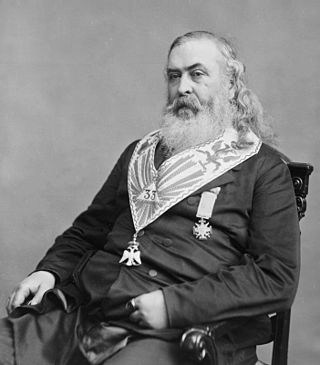
Albert Pike was an American author, poet, orator, editor, lawyer, jurist and Confederate general who served as an associate justice of the Arkansas Supreme Court in exile from 1864 to 1865. He had previously served as a senior officer of the Confederate States Army, commanding the District of Indian Territory in the Trans-Mississippi Theater. A prominent member of the Freemasons, Pike served as the Sovereign Grand Commander of the Supreme Council, Scottish Rite from 1859 to 1891.
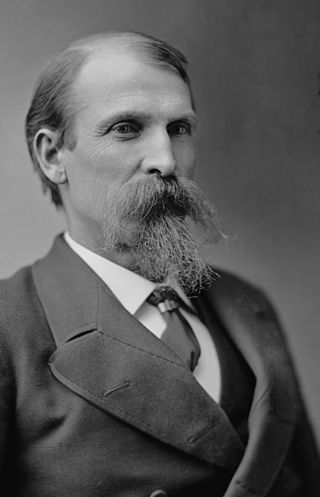
Powell Foulk Clayton was an American politician, diplomat, and businessman who served as the 9th governor of Arkansas from 1868 to 1871, as a Republican member of the U.S. Senate for Arkansas from 1871 to 1877 and as U.S. Ambassador to Mexico from 1897 to 1905.

Thomas James Churchill was an American politician who served as the 13th governor of Arkansas from 1881 to 1883. Before that, he was a senior officer of the Confederate States Army who commanded infantry in the Western and Trans-Mississippi theaters of the American Civil War.

The Brooks–Baxter War, also known as the Brooks–Baxter Affair, was an attempt made by failed gubernatorial candidate Joseph Brooks of the “Brindle-tail” faction of Arkansas' Republican Party to take control of the state from Elisha Baxter, who was the Republican governor. The victor in the end was the Baxter administration, also known as the "Minstrels", supported by "carpetbaggers" over the Brindle-tails supported by "scalawags" and "freedmen".

Elisha Baxter was an American businessman and politician who served as the 10th governor of Arkansas from 1873 to 1874.
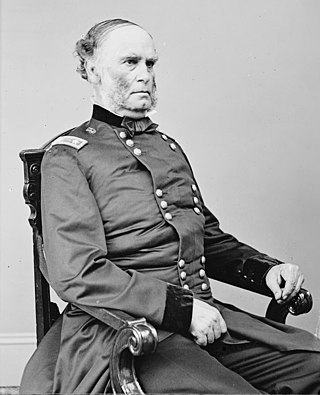
Samuel Ryan Curtis was an American military officer and one of the first Republicans elected to Congress. He was most famous for his role as a Union Army general in the Trans-Mississippi Theater of the American Civil War, especially for his victories at the Battles of Pea Ridge in 1862 and Westport in 1864.

John Potts Slough was an American politician, lawyer, Union general during the American Civil War, and Chief Justice of New Mexico. He commanded the Union forces at the Battle of Glorieta Pass.

Amasa Cobb was an American politician and judge. He was the 6th and 9th Chief Justice of the Nebraska Supreme Court and the 5th Mayor of Lincoln, Nebraska. Earlier in his life, he was a United States Congressman from Wisconsin for 8 years and served as the 13th Speaker of the Wisconsin State Assembly. He also served as a Union Army officer during the American Civil War.

Thomas Mead Bowen was a state legislator in Iowa and Colorado, a Union Army officer during the American Civil War, a justice of the Arkansas Supreme Court, briefly the Governor of Idaho Territory, an elected judge in Colorado and a United States senator from Colorado.

Peter Thacher Washburn was a Vermont lawyer, politician and soldier. A veteran of the American Civil War, he served as the 31st governor of Vermont as a Republican from 1869 to 1870, and was the first Vermont Governor to die in office.

During the American Civil War, Arkansas was a Confederate state, though it had initially voted to remain in the Union. Following the capture of Fort Sumter in April 1861, Abraham Lincoln called for troops from every Union state to put down the rebellion, and Arkansas and several other states seceded. For the rest of the civil war, Arkansas played a major role in controlling the Mississippi River, a major waterway.

Joseph Milton Bartholomew was an American lawyer and judge. He was one of the first three justices of the Supreme Court of North Dakota, serving from 1889 through 1900, and was the 2nd chief justice.

Hiram Bronson Granbury was a lawyer and county judge in Texas before the American Civil War. He organized a volunteer company for the Confederate States Army after the outbreak of the Civil War and became its captain. He rose to the grade of brigadier general in the Confederate army. Granbury was one of the six Confederate generals killed at the Battle of Franklin on November 30, 1864.

William Plummer Benton was an American lawyer and soldier who served in both the Mexican–American War and the American Civil War, where he would rise to the rank of brigadier general and, in 1866, after his service had ended, would be awarded the brevet grade of major general.
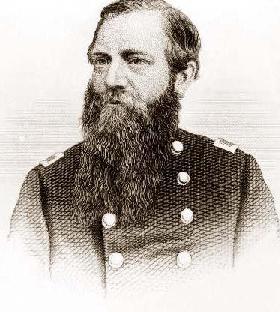
Richard Coulter, Sr. was an American Civil War Colonel and brevet brigadier general of volunteers in the Union Army, a businessman, and banker. During the Civil War he was colonel of the 11th Pennsylvania Infantry, often rising to brigade command upon the wounding of superior officers. In 1866, he was nominated and confirmed as a brevet major general of volunteers to rank from April 1, 1865.
George H. Smith was a Confederate Civil War veteran and prominent Los Angeles lawyer, judge and politician.

Henry Gaston Bunn was an American lawyer, soldier, and politician who served as Chief Justice of the Arkansas Supreme Court.

Daniel Harris Reynolds was a Confederate States Army brigadier general during the American Civil War. He was born at Centerburg, Ohio, but moved to Iowa, Tennessee, and finally to Arkansas before the Civil War. He was a lawyer in Arkansas before the war. After the war, Reynolds resumed his practice of law and was a member of the Arkansas Senate for one term.
Benjamin Franklin Gordon, commonly known as B. Frank Gordon, was a Confederate States Army colonel during the American Civil War. Gordon had been a private and bugler for a Missouri regiment serving in the U.S. Army during the Mexican–American War. Gordon served in the Confederate Army under Brigadier General Joseph O. "Jo" Shelby in Missouri and Arkansas in the Confederate Trans-Mississippi Department throughout the war. On May 16, 1865, with the war coming to an end, General E. Kirby Smith, as the Confederate commander of the Trans-Mississippi Department, assigned Gordon to duty as a brigadier general. The Confederate government took no action on the appointment and Confederate President Jefferson Davis did not officially appoint and nominate Gordon to the rank of brigadier general because the Confederate Senate last met on March 18, 1865, and Davis was captured by Union troops on May 10, 1865. Although he was only aged 40 at his death, Gordon survived the war by little more than a year.
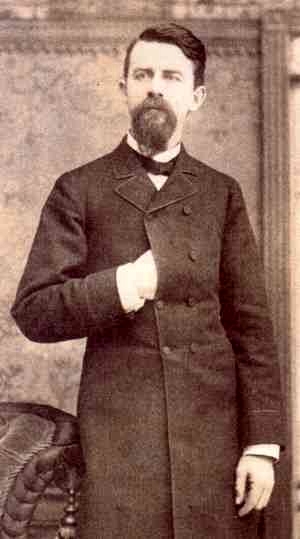
Augustus Gordon Weissert was an American soldier who served in the Union Army during the American Civil War and as the 21st Commander-in-Chief of the Grand Army of the Republic (1892–1893).
References
- 1 2 New England Magazine: An Illustrated Monthly , Vol. 5 (1887), p. 394.
- 1 2 3 4 5 John Livingston, Biographical Sketches of Distinguished Americans Now Living (1853), p. 58.
- 1 2 3 J.W. Looney, Distinguishing the Righteous from the Roguish: The Arkansas Supreme Court, 1836–1874 (2016), p. 246.
- 1 2 G.B. Rose, "The Supreme Court of Arkansas", The Green Bag , Volume 4 (1892), p. 433.